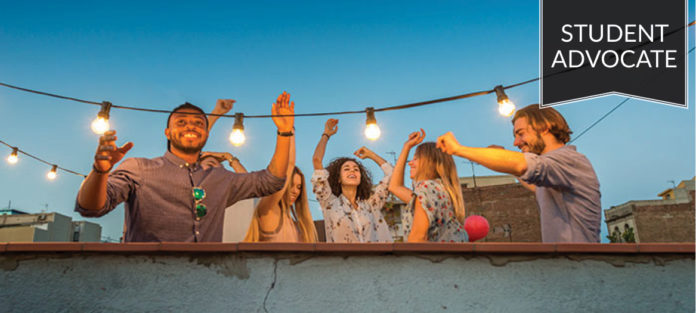
The issue
On many campuses, there’s little to no support available to students who host social events. This is a missed opportunity for staff to unobtrusively, positively shape the culture of their campus.
Why it matters
Student hosts are in a great position to help reduce the rates of sexual assault and heavy drinking. They can help normalize mindful and harm-reducing behaviors.
How to help students plan parties and strengthen your campus culture in the process
1. Build your conversations around the appeal of throwing a great event.
Campus hosts are motivated by the same goals that you have: They want to host a gathering where their friends will have fun; where people feel comfortable, safe, and included; and where no one will throw up on their floor or end up in the hospital. Talk to students about what they want and how they can get there. Keep coming back to this goal. If students have a problematic suggestion for their event, ask them if they think it will get them the positive, fun atmosphere they’re after. Challenging students to think through their goals can be more effective than using scare tactics or blanket bans. Stanford’s Party Planning website is a great resource to show how schools can help regulate parties and help students make better choices.
2. Ask students what they’re struggling with and help them brainstorm a solution.
For example, many students report that managing the door is difficult at large events. How can they turn away a drunk person, especially if it’s a friend or acquaintance? What boundary-setting skills and de-escalation techniques would help? Experienced student hosts know what works in their context, so trust them as a source of potential solutions. Cayuga’s Watchers at Cornell University is a standout program that trains students in bystander intervention techniques and offers their services to help out with student social events.
3. Provide training and other targeted support.
The more conversations you have, the better your understanding of the trickier aspects of planning a student event will be. Consider putting together short workshops that provide student hosts with the skills they want and need (e.g., bartending and mixology, de-escalation training, and bystander intervention moves). Loop students into the workshop planning to ensure that the training is relevant and useful for them, and to secure buy-in from other student hosts.
Tips for event guests: Harvard Drug and Alcohol Peer Advisors
Skills for safe alcohol consumption: TIPS®
What you can do to help: Who Are You? (Video)
Bystander tips and training: University of Arizona (Step UP! Program)
Tom Blake, professional bartender, bar manager, and creator of Crafty Bartending, a popular bartending website and resource.
Melanie Boyd, PhD, assistant dean in student affairs at Yale University; lecturer in women’s, gender, and sexuality studies.
Elizabeth Larsen, student affairs associate, Yale University, Connecticut.
Scott Lukas, PhD, substance use researcher and professor of psychiatry, Harvard Medical School.
Abbey, A. (2002). Alcohol-related sexual assault: A common problem among college students [Supplement]. Journal of Studies on Alcohol and Drugs, 14, 118–128.
Abbey, A. (2011). Alcohol’s role in sexual violence perpetration: Theoretical explanations, existing evidence, and future directions. Drug and Alcohol Review, 30(5), 481–489.
Banyard, V. L., Plante, E. G., & Moynihan, M. M. (2004). Bystander education: Bringing a broader community perspective to sexual violence prevention. Journal of Community Psychology, 32(1), 61–79.
Bay-Cheng, L. Y., & Eliseo-Arras, R. K. (2008). The making of unwanted sex: Gendered and neoliberal norms in college women’s unwanted sexual experiences. Journal of Sex Research, 45(4), 386–397.
Benson, B. J., Gohm, C. L., & Gross, A. M. (2007). College women and sexual assault: The role of sex-related alcohol expectancies. Journal of Family Violence, 22, 341–351.
Carmody, M. (2005). Ethical erotics: Reconceptualizing anti-rape education. Sexualities, 8(4), 465–480.
Hingson, R. W., & Howland, J. (2002). Comprehensive community interventions to promote health: Implications for college-age drinking problems. Journal of Studies on Alcohol Supplement, 14, 226–240.
Lindgren, K. P., Pantalone, D. W., Lewis, M. A., & George, W. H. (2009). College students’ perceptions about alcohol and consensual sexual behavior: Alcohol leads to sex. Journal of Drug Education, 39(1), 1–21.
Mohler-Kuo, M., Dowdall, G. W., Koss, M. P., & Wechsler, H. (2004). Correlates of rape while intoxicated in a national sample of college women. Journal of Studies on Alcohol and Drugs, 65(1), 37–45.
NIDA. (2016, December 13). Monitoring the Future Survey: High School and Youth Trends. Retrieved from https://www.drugabuse.gov/publications/drugfacts/monitoring-future-survey-high-school-youth-trends on 2017, November 26
Schulenberg, J. E., Johnston, L. D., O’Malley, P. M., Bachman, J. G., et al. (2017). Monitoring the Future national survey results on drug use, 1975–2016: Volume II, College students and adults ages 19–55. Ann Arbor: Institute for Social Research, The University of Michigan. Available at https://monitoringthefuture.org/pubs.html#monographs
Sweeney, B. N. (2011). The allure of the freshman girl: Peers, partying, and the sexual assault of first-year college women. Journal of College & Character, 12(4).



























